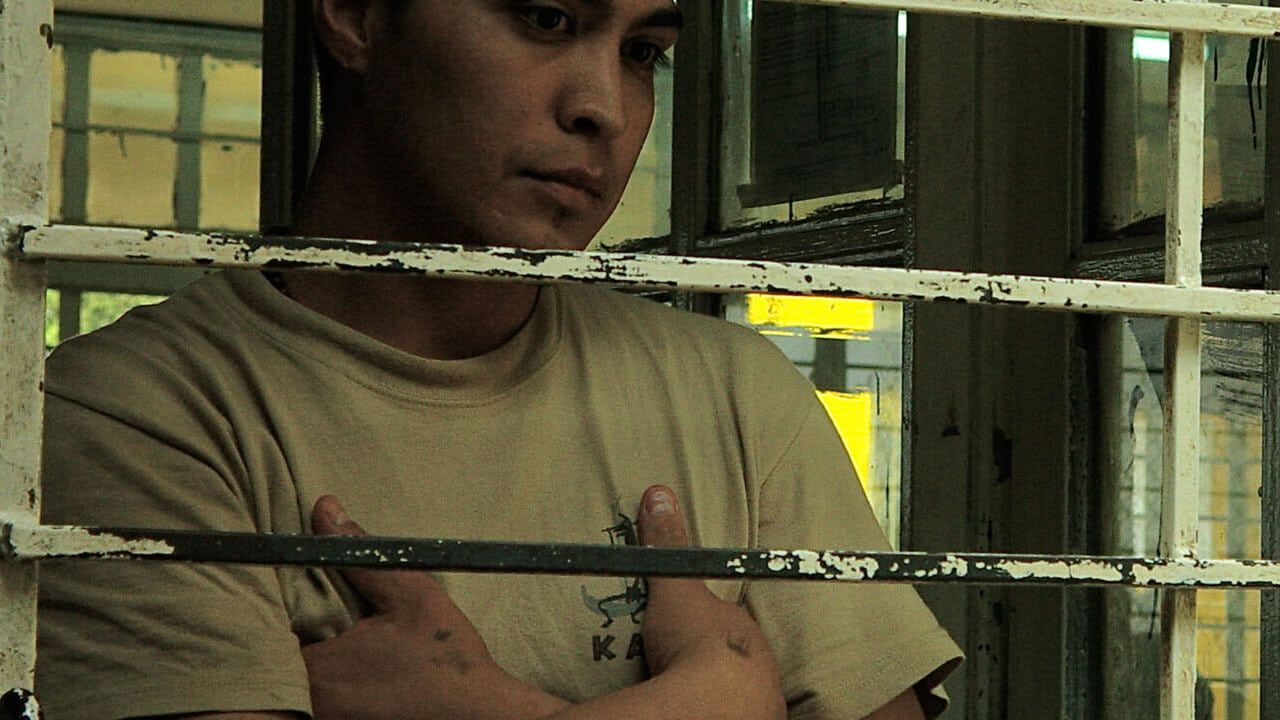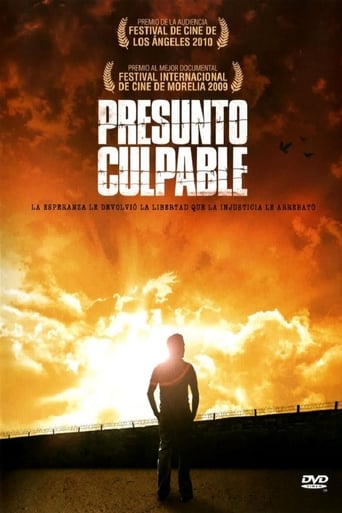

Quoting a previous reviewer, which also describes MY country - the U. S.: "This film is an eye-opener about a sad reality in my country, the unjust and corrupted conviction system."The more ironic part is we have a constitution claiming our supposed innocence; however. the system we fund with tax dollars is setup in such a way that even jurors see "defendants" as guilty from the first moment. Belief in tthe infallability of police (what??) and how the criminal "justice" system is designed to do anything but try the facts. It's just another system designed to keep the rich in power and the poor dirt-poor.The only difference here is that have to pay judges, city/state attorneys, acourt staff, and the jurors to find against the accused, who is 9/10 found guilty. Then, we have to pay jail staff, Medicaid-funded social workers, medical and cafateria staff, and of course the cannot be more oxymoronic if it was designed that way} "corrections officers." and, don't forget probation officers and administrative staff!I mean, these people need jobs - cushy ones! - so we get to pay that, too. While the ones committing the most despicable crime are running the government, taking bribes and giving out millions of our money to their bros doing contract work, outfitting the military, raking in the cash from their wives' charter school, which just directed public funds into private, parochial schools.Yeah, and all that to put some poor dude in jail because he's the same race of who a mixed up, unsure, maybe "eye-witness" maybe saw. Or the man accused pleads to a lesser crimes and five years imprisonment because the only alternative is to be tried by brain-washed jurors and face life in prison.All that say, we spend loads of money putting our presumed guilty through a charade with the same outcome. Why would someone be arrested and in handcuffs if they weren't guilty?? Sheep and cows.Did you know that in most U.S. courts, a jury of only six (6) people decide the fate of a fellow citizen for felony crimes? Or that most jury findings are not unanimous decisions. Bet you didn't....For shame.
... View More*** This review may contain spoilers *** Warning: This review was translated from Spanish electronically. Any misunderstanding, please consult with me before. This review contains spoilers, it is recommended that before you read, watch the movie.As this documentary shows, more than a movie it was very difficult to assign a rating, because it would have to criticize specific studies in an objective manner.The rating that gives a qualitative and also appreciate that we have an ad hoc issue of what happens to the Mexican judicial system. I will not stop by the juridical system review, I will focus on what is striking about this film. Jose Antonio Zuñiga "Toño" is a guy who is in jail for a crime which he did not commit. To prove his innocence, he contacted a couple of Mexican lawyers (Layda Negrete and Robert Hernandez), who decided to take the case and began by reviewing the case file of tone. Noting that the record had many irregularities and contradictions as well as his lawyer pleaded with a professional certificate forgery. This allows them to begin a new trial for Toño. With camera in hand, they show all the process that brought the case of Toño, and is well expressed arrogance, incompetence and negligence by the authorities, who in order to "make his job" they don't care to identify and blaming people without criminological evidence. A judge in the first trial was not present and sentenced to 20 years in prison for an "innocent," without which proved to be guilty. In the second attempt to convict Toño back to 20 years in prison, but this time the decision appealed and the case reached a higher judge committee. One of the three judges evaluators, was the one who supported the innocence of tone and because of that and after 3 years of litigation, Toño is found innocent and released. Qualify this movie on IMDb to 10, "Cine el Miercoles" give's the rating of "Very Good" and hope that one day Mexico will open the eyes and let the incompetence aside and get to work professionally and seriously.
... View MoreAn excellent documentary that not only explores the predicament in which a young man finds himself in after he's accused of a crime he claims he did not commit; but a film which also explores the awkwardness of the Mexican judicial system.Presumed Guilty explores the logic behind Mexico's core due process: All suspects are considered guilty until prove'n innocent. The main character in this film finds himself trapped in this principle. He's arrested by the police, immediately charge with murder and subsequently tried and found guilty for the crime.The film doesn't really explore whether Toño (the defendant) is guilty or not, as we (the audience) are told from the beginning of the film that he is innocent- not only does he claim to be innocent but there is no credible evidence or witnesses proving "without a shadow of a doubt" that he committed the crime. The pro bono lawyers in charge of Toño's case find themselves in a web of irregularities as they analyze the details behind his arrest, trial and conviction. Upon carefully scrutinizing the who's and what's, they come upon the fact that the public defendant who took Toño's first trial did not have a real license to practice and because of this, they were able to request a new trial.As they prepare for a new trial, we discover that there is a short window of opportunity for the defense to prepare their case, in fact, we further learn that the defense has really no case to prepare as there will be no trial in the broad sense and this is when the documentary takes its awful turn at exposing the absurdity of the Mexican trial system. As some may know, there is no case law in Mexico and no trial by jury, so to say, as we are used to in the United States. In fact, many Mexican viewers find American crime investigation and police procedural and legal dramas such as Law and Order so fascinating because of their nonexistent nature in Mexican criminal and legal culture- both in real life and fiction.So as the documentary progresses, we learn that this new trial is simply a review of the previous trial. There will be no new witnesses, no new evidence, no new testimonies, or alibis, or the such. Based on the same witnesses, same testimonies, and same evidence that was used to convict Toño the first time, the same judge who presided the first trial will again decide whether to overturn Toño's conviction or sentence him to the same or more amount of years.As the circus begins, we realize that first of all the courtroom is not a courtroom at all, it is a cramped office with desks, computers, and tons of paperwork with office employees going about their business. This office has a cage where the defendant remains locked in. The trial review begins with the arresting officers who took Toño into custody the day of the murder. They are questioned on several aspects of the events that took place that day including how they came upon to arresting Toño as the murder suspect, these men simply reply that these events took place a long time ago and cannot remember and therefore are quickly dismissed. Later on, the only accusing witness is brought in and he explains how he knows Toño is the murderer because he saw Toño with the murder weapon at an earlier time and when police described what weapon was used in the crime, he was able to pinpoint Toño as the shooting suspect, he nonetheless states that he never actually saw Toño shooting the victim.An interesting turn that this "mock trial" takes is when they do what is called "el careo" or the face-off. "El careo" is when both the defendant who literally remains locked behind bars, faces off with the arresting officers and accusing witness. At this time he has an opportunity to only question what was recorded on the original trial such as "why did you state that I am the killer?" or he questions the arresting officer "what did you tell me when I asked you what I was being accused of?", the officer replies "I arrest people all the time and cannot remember every event that takes place." The defendant then proceeds to say "may I refresh your memory and remind you that what you said is 'we have YOU in custody and so you're f*cked'."After the retrial, if we can call it so, Toño is told by some office clerk, that he was again found guilty of murder and sentenced again to 20-something years in prison, he is then given a paper copy of his sentence as to "keep this receipt in your records as proof that you have been found guilty of murder and sentenced to more than 20 years in prison."There is a lot of loopholes in the system the film does not cover simply because it focuses on the main character's quest for justice, rather than what is wrong with the system; however, the film does give a good insight of how upside down the legal system is in Mexico. This documentary may not do a lot to fix what is wrong in Mexico but it is a start in bringing awareness to the Mexican people that they can have a better Mexico and hopefully a lot more films like this, exposing the different issues Mexico faces today, will surface and perhaps one day things will be different.Watch the film, it is worth it.
... View MoreThis film is an eye-opener about a sad reality in my country, the unjust and corrupted conviction system.The documentary follows the case of Toño, a flea market computer technician that happened to have the bad luck of being picked by the police as guilty of murdering a man who he didn't even meet. From that moment his life and his family's becomes a living hell because in Mexico you need to prove your innocence, so you're guilty until proved otherwise. So he's convicted for 20 years and now a couple of young lawyers take on the mission of helping him get his freedom and record all the re-trial process.IMHO, it's the kind of important film not to be missed, and most important, to take action and demand that several reforms must be made.
... View More